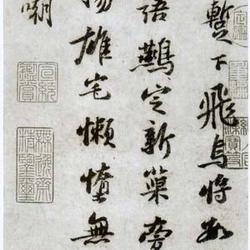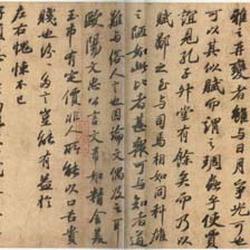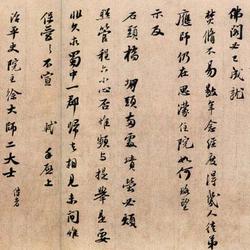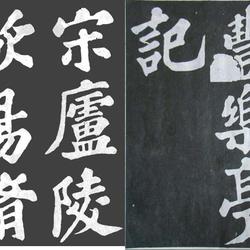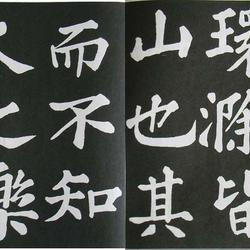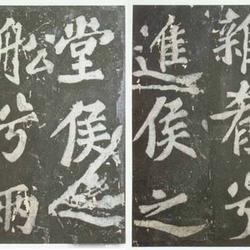"Dark Clouds in the Sky" is also known as "Songyang Tie". It is a chapter of Su Shi's poems in running script. The original work was collected by Xiang Yuanbian in the Ming Dynasty. It was returned to Weng Fanggang in the Qing Dynasty and has an inscription and postscript by Weng. There are thirty-six lines in total, totaling 307 words. The hiding place is unknown.
This post has no year date. According to research by Weng Fanggang of the Qing Dynasty, Su Shi wrote "Chang Run Dao Zhong, there is money in Tang Dynasty, and five ancient poems are sent". The second chapter has the sentence "Last year when catkins were flying, I remembered the golden cage with snow clothes" , and also noted: "Hangzhou people release pigeons to celebrate the longevity of the prefect." This is exactly what the post said about the incident of prefect Chen releasing prostitutes in the camp in Zhou Shao, which was praised by the people of Hangzhou. Because there is a story in Zhou Shao's poem about "opening the cage and releasing a girl in snow clothes", it is appropriate to release doves for longevity. This happened in the fifth or sixth year of Xining. Weng's examination of the poems of the Soviet Union is also included in the collection of "Passing Weizhou Station," and saw a poem written by Cai Junmo on the wall: "The new beauty is in the eyes, and the old things are on the brows. When spring comes, how much sorrow is there? It is like the spring tide that increases every night. I don't know. For whom was it written? "He Yi". This happened when Su Shi moved from Mizhou to Xuzhou, that is, when Su Shi was celebrating his birthday in Weizhou in the ninth year of Xining. Weng immediately guessed that this post was written in the tenth year of Xining. However, There is a contradiction between the poem and the post: the post says that "I was in Qiantang" and saw Cai Junmo's poem "Chua Yue Xin Jiao" written on the wall of the small pavilion in front of the hall, while the poem says: "After passing Weizhou Post, I saw a poem written by Cai Junmo on the wall that said: 'Chuayue Xinjiao...'. "There must be a falsehood between the two. Furthermore, "Su Wenzhonggong's Compilation and Annotation of Poems" also contains Su Shi's "Cai Junmo's Poems": "This Cai Junmo - "Dream" - poem, the original is in the Jiming family, the writing is powerful . " and signed it as "October 4th, the fifth year of Yuanhao". This is when Su Shi learned about Hangzhou, fifteen or six years after he first died in Hangzhou. This leaves room for speculation. But in the post, "Servant is here" "Qiantang" means that he must not have been in Qiantang when this post was written. Therefore, it is more reasonable to date it to about ten years of Xining. However, Weng also said in the examination of the post that this post is quite similar to "Man Ting Fang Ci - Written for Chief Wang" " and "Shangqing Palace Ci". The former was written in the sixth year of Yuanfeng, and the latter was written in the second year of Yuanhao. Therefore, it is concluded that it was between the tenth year of Xining and the second year of Yuanhao. This adds another layer of difficulty. .
After Weng collected this post, another controversy arose over whether Jun should complete it. Because there are many surviving copies of Su's calligraphy with hooks and hooks, and the paper of this calligraphy is seriously scratched and "there are two missing points in the description," it is doubtful. However, Weng definitely said that this was an authentic copy, and compared this calligraphy with the engraving of "Kuaixuetang Tie" one by one, and concluded that the engraving of "Kuaixuetang Tie" was based on the copy recorded by Dong Qichang. Until more evidence is found, it makes sense for us to respect Weng's theory.
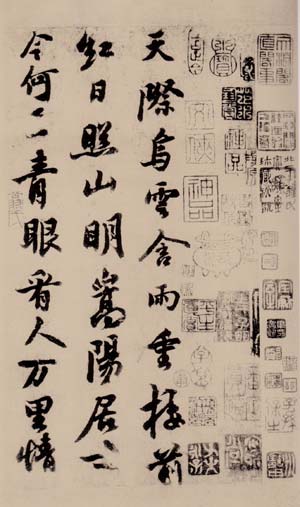
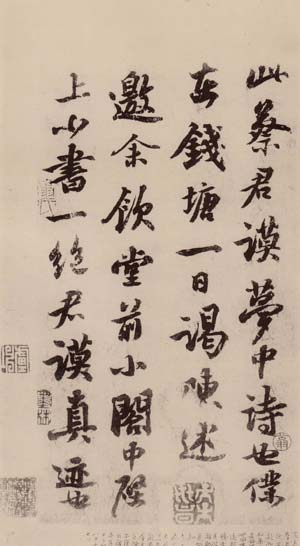
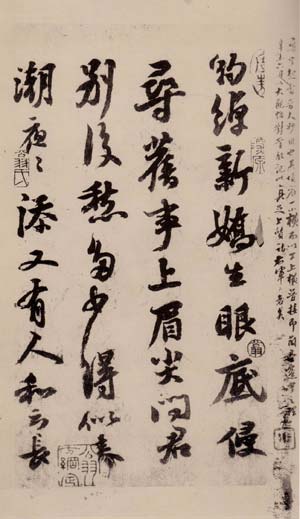
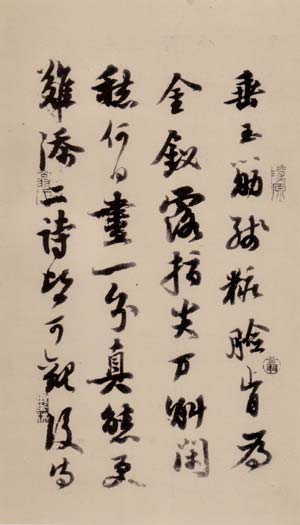
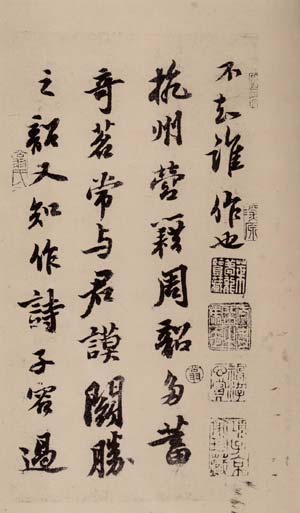
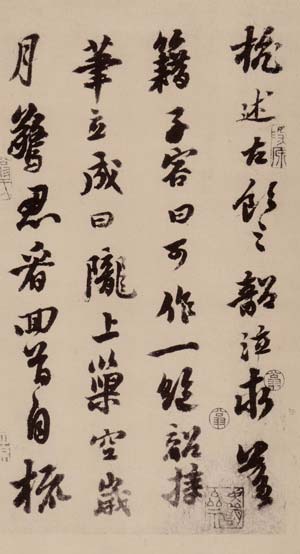
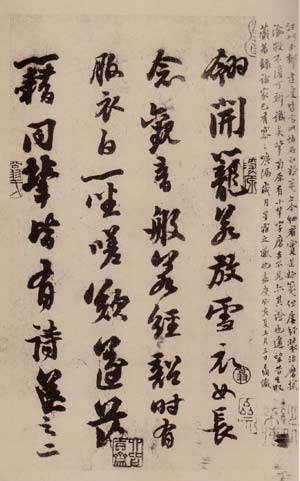
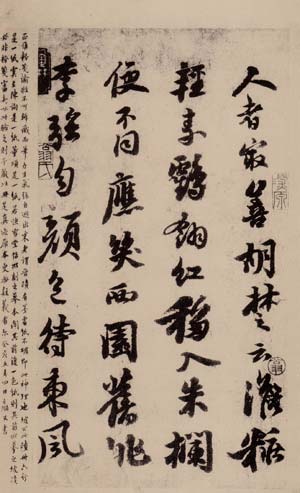
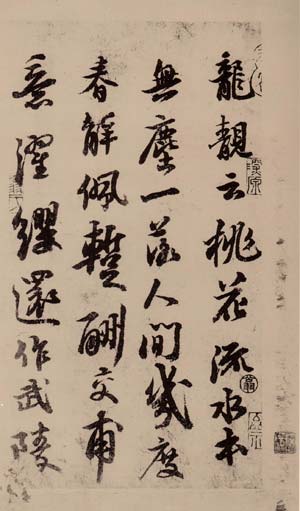
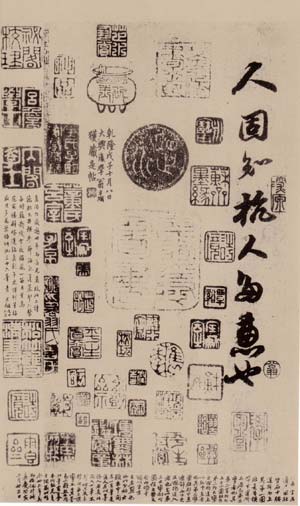
Appendix: Explanation of "Chinese Ink Painting Classic - Su Shi's Black Clouds in the Sky" published by Shanghai Painting and Calligraphy Publishing House:
Introduction to Su Shi's "Dark Clouds in the Sky"
Su Shi (1037-1102, courtesy name Zizhan, alias Dongpo Jushi. A native of Meishan, Meizhou (today's Meishan, Sichuan). From official position to Duanming Palace, he was a bachelor's degree student in the Hanlin Academy and a minister of the Ministry of Rites. He was given the posthumous title Wenzhong. Su Shi was erudite and talented. . His literary work has been regarded as one of the eight great prose writers of the Tang and Song dynasties. He is one of the eight great writers of prose in the Tang and Song dynasties. His poetry and lyrics are of a bold and unrestrained school, and he is also known as one Su together with his father Xun and his younger brother Zhe. His work on flowers and birds is not based on physical resemblance, but for meaning and interest. He is a pioneer of literati. The first of its kind in painting. His calligraphy is renowned for his profound brushstrokes, bold gestures, and originality. He ranks first among the "Four Masters of the Song Dynasty".
"Dark Clouds in the Sky", also known as "Songyang Tie", is written in running script, with a total of thirty-six lines, totaling 307 characters. This post has no year date. According to Weng Fanggang of the Qing Dynasty, it was written in more than ten years from the 10th year of Xining (1077) to Yuanyou Dingmao (1087), when Su Dongpo was 42 to 5 years old. At the age of twelve. It should be said that this is a work from a relatively mature period of Su's calligraphy art.
Looking at the whole article, the writing style is dignified and full of charm, the strokes are round, simple and lush, and each stroke has the power to conquer thousands of people. If we look at the use of pens, the Su character is largely due to Yan Zhenqing's writing style. The writing is calm, the strokes are slow and progressive, and the lifting and turning are dignified, so the lines are round, rich and full of connotation. According to records, when Su Dongpo was young, he imitated Xu Kuaiji, and his writing was round and graceful. When he was in his middle age, he wrote Yan Shangshu. ” (Huang Tingjian’s "Valley Collection"). "Dark Clouds in the Sky" clearly contains the traces of Yan characters, which is a natural expression of Su's middle-aged writing of Yan characters.
The pen is powerful, but it can write freely; it is a patriarchal tradition, but it can come up with new ideas from time to time. This is Su's extraordinary ability to control the pen and ink shown to us in this post. As the main representative of Shangyi calligraphy style, Su Dongpo's artistic pursuit has always emphasized self-expression and expression of temperament. He has repeatedly said to himself, "I am incapable of creating calligraphy. I use my free hand in stipple painting to strongly express an artistic emotion that is not bound by ropes and advocates self-respect and nature." Appreciating this post, you can feel that the author is in a state of mind from beginning to end, and his writing is free from excitement. The reflection and association of the characters, the free and easy style of the characters, and the staggered size of the character columns all create a natural artistic scene. The so-called "not reserved but beautiful, not restrained but strict, not elegant but heroic, with a relaxed appearance, falling like sweet rain, covered by forest trees, shining like stars from the moon, lingering in the wind, lingering like a cocoon." The silk air shows a poetic beauty.
Huang Tingjian once said: "I said that Dongpo's books are filled with the spirit of learning and writing, which is full of vitality between the pen and ink." ’ Indeed, Su Shi’s desolate temperament and scholarly writing style were the fundamental source of the charm of his calligraphy art. (Zhang Weisheng)
Explanation:
"The sky is dark with heavy rain, and the red sun shines brightly on the mountains in front of the building. Where is Songyang layman now? His blue eyes can see the love of people thousands of miles away." This is the poem "In a Dream" by Cai Junmo. The servant was in Qiantang. One day he paid homage to me (in ancient times) and invited me to drink in a small gathering in front of the hall. The small book on the wall is unique and is the original work of Jun Mo. "The new love is in my eyes, and the old things are on my brows. I ask you how much sorrow you have after saying goodbye, and it feels like the spring tide that grows every night." Someone else said: "The jade tendons hanging down on the face are remnant of make-up, and the fingertips are willing to show off for gold hairpins." When will all the worries of dendrobium be exhausted, it will be even harder to add a bit of truth." Both poems are impressive, but I don't know who wrote the latter one.
The Hangzhou camp was born in Zhou Shao, and he stored a lot of exotic tea. He often fought with Jun Mo and won. Shao also knew how to write poetry. Zirong passed through Hangzhou and told about ancient drinking. He wept in Shao and asked for his place of residence. Zirong said: "It can be a masterpiece." Shao Yuan wrote and said: "The empty nest in Longshang is frightened by the years. I can't bear to look back and comb my feathers. When I open the cage, it is like letting a woman in snow clothes go and recite the Avalokitesvara Prajna Sutra for a long time." He was dressed in white clothes. He sat down and sighed. Then he settled down. Everyone of the same generation has poems to send to them, and the two of them are the best. Hu Chuyun: "Light makeup and plain crane feather red, it will be different when you move into the vermilion fence. You should laugh at the old peaches and plums in the West Garden, and wait for the east wind to strengthen the color." Long Liangyun: "The peach blossoms are dust-free in the flowing water, and they spring several times once they fall into the world. Xie Pei As a temporary reward, I wish to pay you a favor, and Zhuo Ying will return to Wuling." So I know that the people of Hangzhou will benefit a lot.

